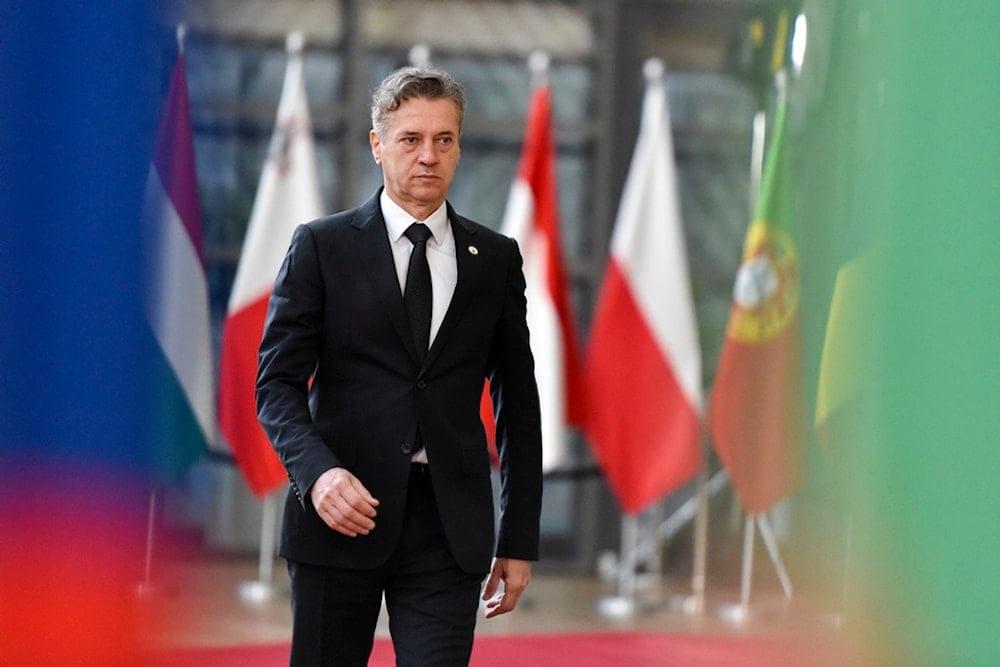Slovenia set to examine recognition of Palestinian State on Thursday
Slovenia has joined the wave of countries moving toward the recognition of a Palestinian State.
-

Slovenia's Prime Minister Robert Golob arrives for an EU summit in Brussels, Thursday, April 18, 2024. (AP)
The government of Slovenia will study a proposal to recognize the State of Palestine on Thursday, before referring it to the country's legislative council for approval.
According to Slovenian Prime Minister Robert Golob, the country will continue coordinating with a group of like-minded nations to exert "maximum possible pressure to achieve an immediate ceasefire in the Gaza Strip and to secure the release of Israeli hostages from there."
Golob added in a statement published on the government’s website on Monday that his country "has a duty to do everything possible to achieve lasting peace in the Middle East, as a responsible member of the United Nations Security Council."
It is worth noting that on May 9, the Slovenian government approved a decree recognizing the independent State of Palestine, which will be sent to parliament for approval in June.
At that time, the prime minister stated that the decree represents "part of Slovenia's efforts to end the atrocities in the Gaza Strip as soon as possible," indicating that a final decision on the matter could be made earlier than the scheduled date of June 13.
In a bold move on the global stage, Slovenia has joined a coalition of European Union countries in a significant diplomatic initiative: the recognition of a Palestinian state pic.twitter.com/oDdEMp6SMu
— PALESTINE ONLINE 🇵🇸 (@OnlinePalEng) May 28, 2024
Global echoes of recognizing a Palestinian state
The prospects for the Palestinian people achieving their state might seem more distant than ever amid the ongoing Israeli genocide in Gaza and the escalating violence against Palestinians in the occupied West Bank.
However, several European countries are moving forward with the formal recognition of a Palestinian state. The actions taken on Tuesday by Ireland, Spain, and Norway, announced last week, are likely to pressure other European nations, such as the UK, France, and Germany, to join them in supporting Palestinian self-determination.
Dive Deeper
Most countries—approximately 139 in total—formally recognize a Palestinian state. On May 10, 143 out of 193 United Nations General Assembly members voted in favor of a Palestinian bid for full UN membership, a status that is available only to states. Currently, Palestine holds an enhanced observer status at the UN, which allows them a seat but no voting rights in the assembly. Additionally, Palestine is recognized by various international organizations, including the Arab League and the Organisation of Islamic Cooperation.
A minority of European countries already recognize a Palestinian state. These include Hungary, Poland, Romania, the Czech Republic, Slovakia, and Bulgaria, which adopted this stance in 1988, as well as others like Sweden and Cyprus. However, many European nations and the United States have stated that they will recognize a Palestinian state only as part of a comprehensive political resolution to the Middle East struggle. This approach is often referred to as the "two-state solution".
The Big Picture
European countries and the US have different views on when to recognize a Palestinian state. Ireland, Spain, and Norway are choosing to do so now to jump-start a political process. They believe that a lasting solution to the current crisis will only be possible if both sides can work towards a political goal. These countries are also responding to domestic political pressures to show greater support for Palestinians.
Historically, many Western countries held the position that Palestinian statehood should be a reward for a final peace agreement. However, Lord Cameron, the UK Foreign Secretary, along with officials from several other European countries, have recently shifted their stance. They now suggest that recognizing Palestinian statehood earlier could help generate momentum toward achieving a political settlement.
As of last week, several additional European countries now support the establishment of a Palestinian state.

 4 Min Read
4 Min Read








